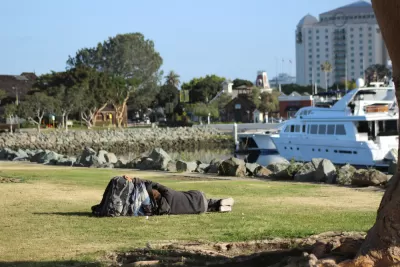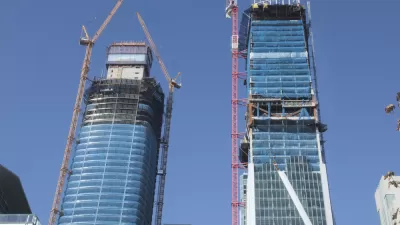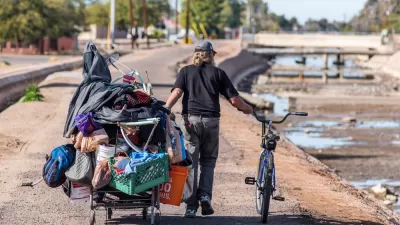The city’s new $6.5 million "bridge shelters" are providing a place to stay, but not accomplishing what they set out to do.

In the aftermath of the Hepatitis A outbreak last year, San Diego established three "bridge shelters," which originally were supposed to be a place for people who already had been given a housing subsidy but had not yet been matched with a permanent place to live.
But while hundreds of people have gone in, or gone in and come out and gone in again, only a fraction have been moved into homes or apartments.
"Critics," writes John Wilkins of the Union-Tribune, "say the poor performance is a reflection of a dysfunctional system that overemphasizes emergency shelters and hasn’t figured out how to align the community’s resources with the longer-term needs of the homeless."
San Diego has the fourth-largest homeless population in the nation, in part because it suffers from the same affordability crisis as other big cities in California (and elsewhere). Downtown San Diego doubled its number of housing units between 2010 and 2015, but saw rents double as well.
FULL STORY: City's shelters falling short of goals in finding permanent housing for the homeless

Maui's Vacation Rental Debate Turns Ugly
Verbal attacks, misinformation campaigns and fistfights plague a high-stakes debate to convert thousands of vacation rentals into long-term housing.

Planetizen Federal Action Tracker
A weekly monitor of how Trump’s orders and actions are impacting planners and planning in America.

In Urban Planning, AI Prompting Could be the New Design Thinking
Creativity has long been key to great urban design. What if we see AI as our new creative partner?

Pedestrian Deaths Drop, Remain Twice as High as in 2009
Fatalities declined by 4 percent in 2024, but the U.S. is still nowhere close to ‘Vision Zero.’

King County Supportive Housing Program Offers Hope for Unhoused Residents
The county is taking a ‘Housing First’ approach that prioritizes getting people into housing, then offering wraparound supportive services.

Researchers Use AI to Get Clearer Picture of US Housing
Analysts are using artificial intelligence to supercharge their research by allowing them to comb through data faster. Though these AI tools can be error prone, they save time and housing researchers are optimistic about the future.
Urban Design for Planners 1: Software Tools
This six-course series explores essential urban design concepts using open source software and equips planners with the tools they need to participate fully in the urban design process.
Planning for Universal Design
Learn the tools for implementing Universal Design in planning regulations.
planning NEXT
Appalachian Highlands Housing Partners
Mpact (founded as Rail~Volution)
City of Camden Redevelopment Agency
City of Astoria
City of Portland
City of Laramie





























